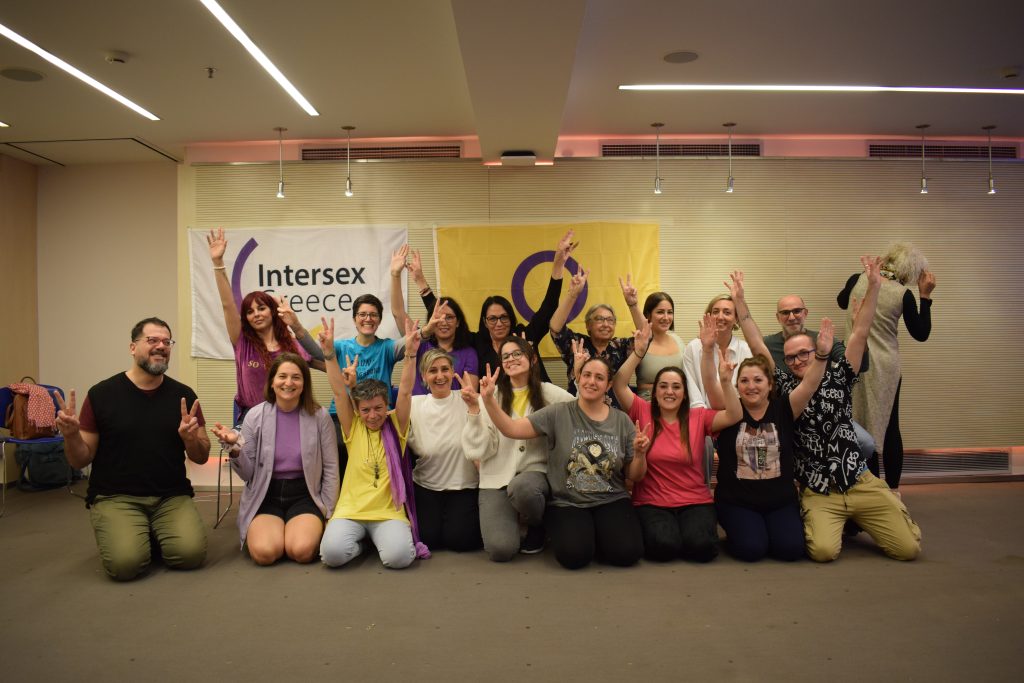For many decades, and especially since the Stonewall riots in 1969, lesbian, gay, bisexual, transgender, intersex, and queer people, activists, and allies have celebrated the diversity of our communities and fought against prejudice, discrimination, and violence. While too many queer and trans people still face grave human rights violence daily, it is incredible to reflect on the progress that has been made over the last 50+ years.

4 Public: Members of Intersex Greece attending 3rd annual Pan-Hellenic meeting in Crete, 2023. Photo courtesy of the authors.
However, despite significant gains for the LGBT+ movement overall, the unique struggles and activism of intersex people remain less visible, misunderstood, and vastly under-resourced. Intersex people represent approximately 1.7 percent of the global population, or 136 million people, who are born with variations in sex characteristics (or develop them in childhood).
Intersex traits are perfectly healthy and natural human variations – and not that rare – but tragically, many intersex people face extreme stigma and are often subject to harmful, irreversible, and medically unnecessary surgical interventions in infancy. In some communities, they are abandoned or even killed soon after birth, simply due to their natural physical variations.
Many intersex people also face violence and discrimination later in childhood and as adults. School-age children face bullying and sometimes must drop out of school. All intersex people lack access to competent intersex-affirming healthcare, and some struggle to find employment or are discriminated against in the workplace. Some female athletes are barred from competing in women’s sports simply due to their natural variations, such as hormone levels.
Sadly, due to the stigma combined with harmful practices, most intersex people suffer from not only physical harm but also significant emotional harm, including anxiety, depression, and post-traumatic stress syndrome, and suicide rates are higher in this community as well.

Intersex Philippines: Members of Intersex Philippines participate in a media conference, launching their new awareness-raising coffee table book and discussing the status of the Cagandahan bill. Photo courtesy of the authors.
There is good news: the intersex rights movement is relatively young, but it has grown exponentially in the past 30 years. Today, there are dozens of organizations and emerging regional networks supporting intersex people in every corner of the world, led by experienced and emerging intersex activists who are making groundbreaking progress. For example, in Greece, activists from Intersex Greece helped pass a law in 2022 banning nonconsensual and medically unnecessary surgery on intersex children under age 15 – one of only nine such laws in the world. Also, in 2022, Kenya modified its Children’s Rights Act to include protections for intersex children. Activists are currently advocating for a comprehensive intersex rights bill in Parliament, which advocates for broad rights and protections in education, healthcare, the workplace, and more. We have also recently seen groundbreaking progress with the passage of laws at the subnational level in both India and Australia, providing protections for intersex children against harmful medical practices.
In 2023, ILGA World published the first comprehensive Intersex Legal Mapping Report outlining legal protections for intersex people in all 193 United Nations Member States and featuring interviews with leading intersex activists in several countries. This year, Outright International launched a new global program to focus on the rights and activism of intersex communities, especially in less-resourced regions and countries of the Global South and East.
Most recently, in April of 2024, the UN Human Rights Council passed the first-ever resolution on intersex rights, which mandates the UN Office of the High Commissioner to host a multidisciplinary panel and publish the first formal UN Report on Combating Discrimination, Violence, and Harmful Practices against Intersex Persons. This groundbreaking action came after nearly a decade of advocacy, resulting in several intersex supportive statements from various UN bodies, and represents a pivotal milestone for this growing movement.
In August, World Health Organization researchers published a groundbreaking, systematic review focused on medical rationales for sex-normalizing surgeries, calling for institutional action to stop these harmful, medically unnecessary procedures.
Today, there is much hope for more progress on the horizon, with increased awareness-raising and advocacy efforts from activists and allies worldwide. For example, access to legal gender recognition for intersex people in the Philippines, intersex-affirming health guidelines regarding nonconsensual childhood surgeries in Chile, and regional organizing of the African Intersex Movement (AIM), just to name a few.
While we applaud and support the growing global intersex movement, activists greatly need more intersectional allies and resources to step up and invest in their work. Overall, less than half the total global funding for LGBT+ issues goes to programs outside the US and Canada, and only 5 percent of global foundation giving – and 1 percent of government funding – goes to human rights causes globally to support LGBT+ communities. Even worse, in 2021-2022, only 2 percent of all funding for LGBTI issues outside the US specifically focused on intersex communities. To make matters worse, one of the few and largest private foundations supporting the intersex movement just announced it will be closing its doors, leaving a huge gap that urgently needs to be filled.
The urgency of eradicating human rights abuses against intersex people is a truly intersectional challenge that crosses into not only LGBT+ rights but also children’s rights, disability rights, as well as women’s and reproductive rights. There is a tremendous opportunity for funders who care about all of these issues to accelerate social and legal change to improve the lives of intersex people worldwide by supporting the efforts of proven and promising intersex leaders and organizations. Intersex Awareness Day is the perfect time to start.
Kimberly Zieselman, JD is the Senior Advisor for Global Intersex Rights, and Katie Hultquist is the Director of Leadership Giving at Outright International.







Comments (0)